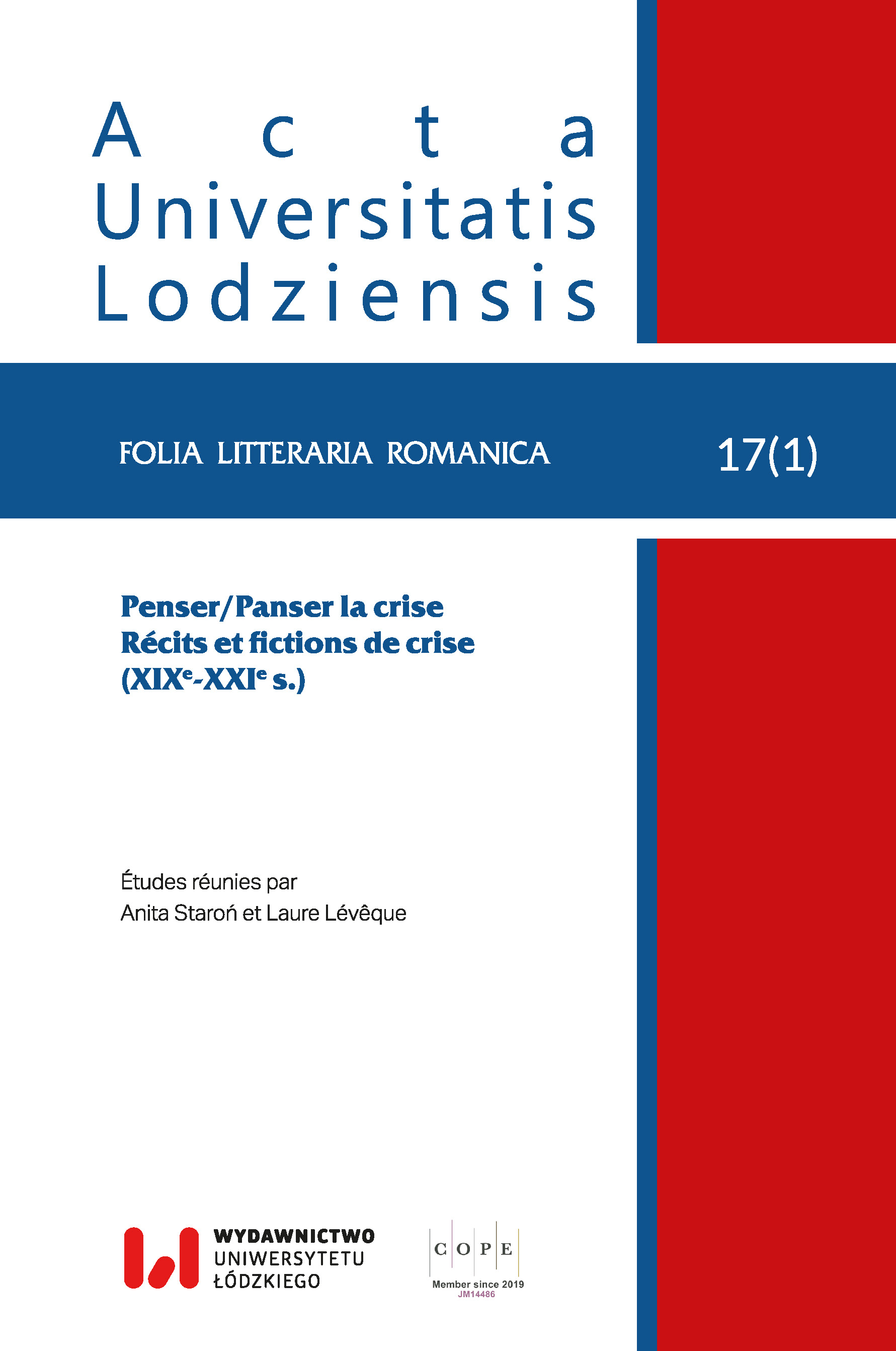Economic Crisis and Human Drama in "Article 353 du code pénal" by Tanguy Viel
DOI:
https://doi.org/10.18778/1505-9065.17.1.17Keywords:
crisis, fraud, human drama, Tanguy VielAbstract
The article focuses on the methods of literary engagement with the crisis in Article 353 du code pénal, the most realistic novel by Tanguy Viel. Drawing on selected theories of the crisis, it analyses the way in which the author speaks of the human drama engendered by the economic recession and the pathological phenomena linked to it. It also highlights the didactic dimension of the text, which consists in denouncing of the strategies of financial scams, based on a perfect knowledge of the psychological mechanisms that are activated in an individual in critical situations. The aim of the article is to demonstrate that in Article 353 du code pénal Viel seeks to shed light on the fact that the existential crisis triggered by loss or abuse of trust suffered in life and the feeling of powerlessness in the face of destiny is an even more difficult ordeal, overwhelming and devastating if it strikes a vulnerable individual who lacks the psychological strength to recover.
Downloads
References
Allemand, Roger-Michel, « Tanguy Viel : imaginaires d’un romancier », @nalyses, 2008, vol. 3, nº 2, p. 297-314
Google Scholar
Arendt, Hannah, La Crise de la culture [1954], Paris, Gallimard, 1972
Google Scholar
Attali, Jacques, La crise, et après ?, Paris, Fayard, 2008
Google Scholar
Chaudier, Stéphane, Négrel, Julian, « Tanguy Viel : l’empire des passions tristes », La revue internationale des livres et des idées, 2009, no 12, p. 54-57
Google Scholar
Ebguy, Jacques-David, « “Effacer le mal” : Tanguy Viel et le réel », in Écrire, disent-ils. Regards croisés sur la littérature du XXIe siècle, éd. Anne Cousseau, Jacques-David Ebguy, Nancy, Presses Universitaires de Nancy, 2012, p. 49-70
Google Scholar
Faerber, Johan, « Le livre aveugle ou la passion anthologique dans l’œuvre de Tanguy Viel », Relief, 2012, no 6 (2), p. 80-95, https://doi.org/10.18352/relief.797
Google Scholar
DOI: https://doi.org/10.18352/relief.797
Gervais, Bertrand, Logiques de l’imaginaire, Montréal, Le Quartanier, 2009
Google Scholar
Lamizet, Bernard, L’Imaginaire politique, Paris, Hermes Science Publications, 2012
Google Scholar
Maziarczyk, Anna, Reconfigurations romanesques de Minuit. Jean Echenoz, Éric Chevillard, Tanguy Viel, Lublin, Wydawnictwo UMCS, 2017
Google Scholar
Morin, Edgar, « Pour une crisologie », Communications, 2012, no 91, p. 135-152, https://doi.org/10.3406/comm.2012.2675
Google Scholar
DOI: https://doi.org/10.3406/comm.2012.2675
Revault d’Allones, Myriam, La Crise sans fin. Essai sur l’expérience moderne du temps, Paris, Seuil, 2012
Google Scholar
Sicotte, Geneviève, « Ce que la littérature peut dire de l’économie », in Fiction et économie. Représentations de l’économie dans la littérature et les arts du spectacle, XIXe–XXIe siècles, éd. G. Sicotte et al., Québec, Presses Universitaires du Laval, 2013
Google Scholar
Viart, Dominique, « Le moment critique de la littérature. Comment penser la littérature contemporaine ? », in Le roman français aujourd’hui. Transformations, perceptions, mythologies, éd. Bruno Blanckeman, Jean-Christophe Millois, Paris, Prétexte Éditeur, 2004, p. 11-35
Google Scholar
Viel, Tanguy, Article 353 du code pénal, Paris, Les Éditions de Minuit, 2017
Google Scholar
Viel, Tanguy, « Habiter une langue qui a ses connivences dans le réel » (Article 353 du code pénal), entretien avec J. Faerber, in Diakritik, le 8 février 2019, en ligne, https://diacritik.com/2019/02/08/tanguy-viel-habiter-une-langue-qui-a-ses-connivences-dans-le-reel-article-353-du-code-penal/ consulté le 5.03.2022
Google Scholar
Published
How to Cite
Issue
Section
License

This work is licensed under a Creative Commons Attribution-NonCommercial-NoDerivatives 4.0 International License.













